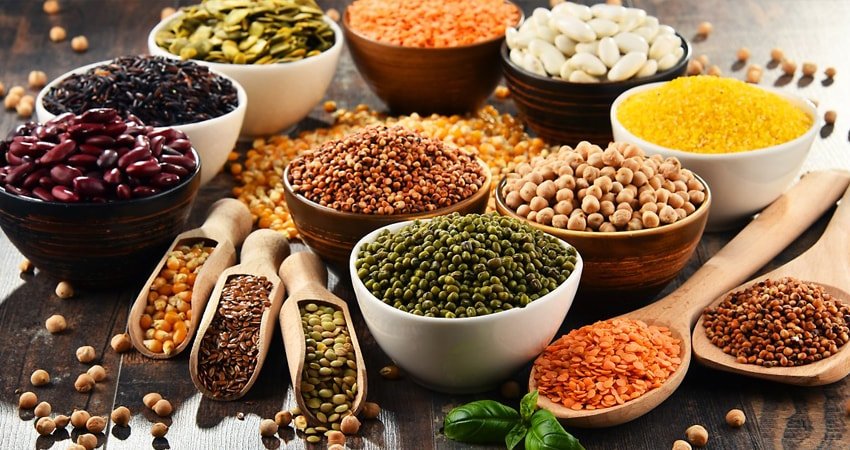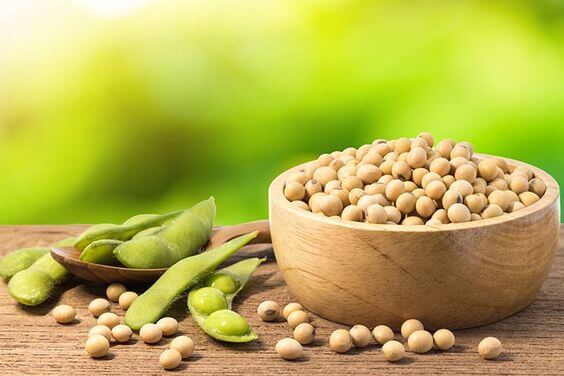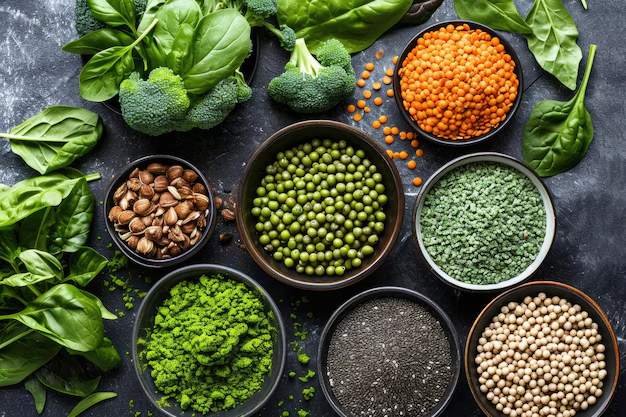Vegetarian protein sources are essential for maintaining muscle mass, supporting metabolism, and promoting overall health, especially for individuals who avoid meat, fish, and poultry. A well-planned vegetarian diet can easily meet daily protein needs by including a variety of plant-based foods such as legumes, dairy products, whole grains, nuts, and seeds. Understanding different vegetarian protein sources helps ensure balanced nutrition across all age groups.
Plants with a high protein content are legumes, cereals, and oilseeds. Fruits, vegetables, algae, and mushrooms also contain them, but in very small quantities. When we talk about plant proteins, we are most often talking about the concentrate of a plant with a high protein content, or a mixture of plants that provides a complete supply of essential amino acids. This article presents the best sources of plant proteins in foods and their combinations. So, see below vegetarian protein sources here…
Protein-Rich Vegetarian Foods:
A plant protein is, as its name suggests, a protein from a plant food: no mystery! Just like animal proteins, plant sources of protein contribute to the proper functioning of the body. They help with tissue structure and play a role in immunity, digestion, and oxygen transport.
You no longer know which foods to include in your plate to add plant proteins to your meals? Here are 8 sources naturally rich in veggie proteins!
Quinoa:

Quinoa is a very interesting pseudo-cereal. It has many nutritional qualities, including its high protein content. It is also the only cereal containing all the essential amino acids. As a reminder, other cereals have a limiting amino acid: lysine.
Quinoa is also known for its richness in omega 3 and its high content of complex carbohydrates and fiber, which helps increase the feeling of satiety.
Legumes:

Legumes are numerous: chickpeas, split peas, red and white beans, but also all lentils (green or coral) are part of this large family.
On average, pulses provide more than 20 g of protein per 100 g of dry food.
Pulses are also to be favored for their high fiber content, guaranteeing good transit and good digestion.
Culinary tip: many legumes can be cooked in the form of hummus. It’s a real treat. With a hummus of chickpeas or red beans, transform your summer meals!
Soy:

Soybeans contain 36 g of protein per 100 g of dry product, making them an excellent source of plant proteins.
The best part? This plant has a complete and balanced aminogram (the proportion of amino acids)!
Be careful, however, avoid eating it more than once a day: it contains controversial phytoestrogens involved in certain harmful effects in the long term.
Chia Seeds:
Chia seeds are a very good source of plant proteins, providing nearly 20g per 100g of product. Moreover, they are classified as “super foods” for their richness in fiber, essential amino acids, and proteins.
In general, per day, we consume 2 tablespoons of seeds in porridge, yogurt, or cake. The most important thing is to let them swell in a liquid before consuming them. You will obtain a gelled texture that will contribute to better satiety.
You can even drink chia seeds! Prepare a glass of water with one to two tablespoons of seeds and lemon juice. Leave to stand in the refrigerator overnight. The next morning, you can enjoy this refreshing and protein-rich drink.
All these foods are interesting for a vegetarian diet and a daily intake of plant proteins. There are still many other sources, such as spirulina, protein powder, fenugreek, etc.
Conclusion
Including a variety of vegetarian protein sources in daily meals is key to achieving adequate protein intake without relying on animal meat. Foods like lentils, beans, dairy products, soy, nuts, and seeds not only provide protein but also supply fiber, vitamins, and minerals. When combined wisely, vegetarian protein sources can fully support strength, immunity, and long-term health.
FAQs
Q. What are the best vegetarian protein sources?
A. Some of the best vegetarian protein sources include lentils, chickpeas, beans, paneer, milk, yogurt, tofu, soybeans, nuts, and seeds.
Q. Can vegetarian protein sources meet daily protein requirements?
A. Yes. With proper meal planning and variety, vegetarian protein sources can meet daily protein needs for most people.
Q. Are vegetarian protein sources good for muscle building?
A. Yes. Combining different vegetarian protein sources helps provide all essential amino acids needed for muscle growth and repair.
Q. Which vegetarian protein sources are suitable for weight loss?
A. Low-fat dairy, lentils, beans, tofu, and sprouts are excellent vegetarian protein sources for weight loss due to their high protein and fiber content.
Q. Do vegetarian protein sources contain complete protein?
A. Some do, such as dairy products and soy. Other vegetarian protein sources can be combined (e.g., grains and legumes) to form complete proteins.
Q. Are vegetarian protein sources suitable for all age groups?
A. Yes. Vegetarian protein sources can support nutrition for children, adults, pregnant women, and the elderly when included in balanced meals.

